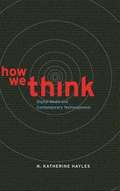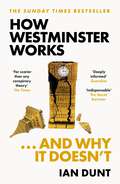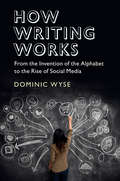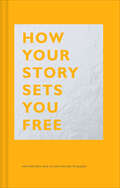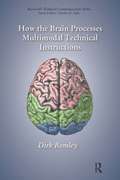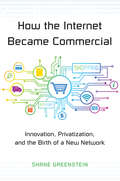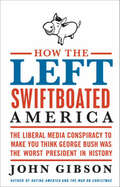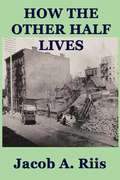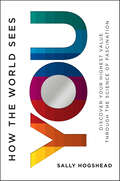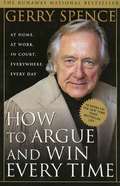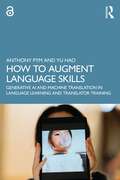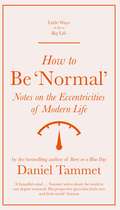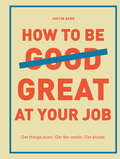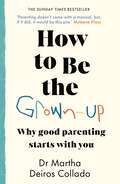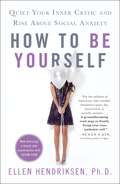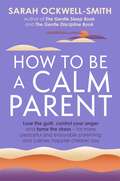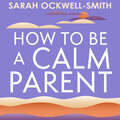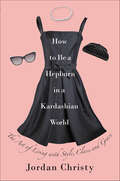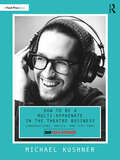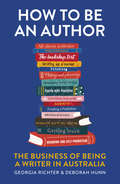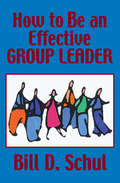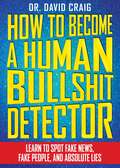- Table View
- List View
How We Think: Digital Media and Contemporary Technogenesis
by N. Katherine Hayles"How do we think?" N. Katherine Hayles poses this question at the beginning of this bracing exploration of the idea that we think through, with, and alongside media. As the age of print passes and new technologies appear every day, this proposition has become far more complicated, particularly for the traditionally print-based disciplines in the humanities and qualitative social sciences. With a rift growing between digital scholarship and its print-based counterpart, Hayles argues for contemporary technogenesis--the belief that humans and technics are coevolving--and advocates for what she calls comparative media studies, a new approach to locating digital work within print traditions and vice versa. Hayles examines the evolution of the field from the traditional humanities and how the digital humanities are changing academic scholarship, research, teaching, and publication. She goes on to depict the neurological consequences of working in digital media, where skimming and scanning, or "hyper reading," and analysis through machine algorithms are forms of reading as valid as close reading once was. Hayles contends that we must recognize all three types of reading and understand the limitations and possibilities of each. In addition to illustrating what a comparative media perspective entails, Hayles explores the technogenesis spiral in its full complexity. She considers the effects of early databases such as telegraph code books and confronts our changing perceptions of time and space in the digital age, illustrating this through three innovative digital productions--Steve Tomasula's electronic novel, TOC; Steven Hall's The Raw Shark Texts; and Mark Z. Danielewski's Only Revolutions. Deepening our understanding of the extraordinary transformative powers digital technologies have placed in the hands of humanists, How We Think presents a cogent rationale for tackling the challenges facing the humanities today.
How Westminster Works . . . and Why It Doesn't: The instant Sunday Times bestseller from the ultimate political insider
by Ian DuntWhy do some prime ministers manage to get things done, while others miserably fail? What is a 'special adviser' and how did they take over British political life? And why is the House of Lords more functional than most people think?Most of us have a sense that our political system doesn't seem to work, but struggle to articulate exactly why. And for good reason: our political and financial institutions are cloaked in secrecy, archaic terminology, ancient custom and impenetrable jargon. Now, expert political journalist Ian Dunt is lifting the lid on British politics to expose every aspect of the setup in a way that can be understood and challenged. From Downing Street to Whitehall, the Commons to the Lords, this book is an indispensable guide to our political system - and how we might begin to fix it.
How Westminster Works . . . and Why It Doesn't: The instant Sunday Times bestseller from the ultimate political insider
by Ian DuntWhy do some prime ministers manage to get things done, while others miserably fail? What is a 'special adviser' and how did they take over British political life? And why is the House of Lords more functional than most people think?Most of us have a sense that our political system doesn't seem to work, but struggle to articulate exactly why. And for good reason: our political and financial institutions are cloaked in secrecy, archaic terminology, ancient custom and impenetrable jargon. Now, expert political journalist Ian Dunt is lifting the lid on British politics to expose every aspect of the setup in a way that can be understood and challenged. From Downing Street to Whitehall, the Commons to the Lords, this book is an indispensable guide to our political system - and how we might begin to fix it.
How Writing Works
by Dominic WyseFrom the invention of the alphabet to the explosion of the internet, Dominic Wyse takes us on a unique journey into the process of writing. Starting with seven extraordinary examples that serve as a backdrop to the themes explored, it pays particular attention to key developments in the history of language, including Aristotle's grammar through socio-cultural multimodality, to pragmatist philosophy of communication. Analogies with music are used as a comparator throughout the book, yielding radically new insights into composition processes. The book presents the first comprehensive analysis of the Paris Review Interviews with the world's greatest writers such as Louise Erdrich, Gabriel Garcia Mrquez, Ted Hughes, and Marilynne Robinson. It critically reviews the most influential guides to styles and standards of language, and presents new research on young people's creativity and writing. Drawing on over twenty years of findings, Wyse presents research-informed innovative practices to demonstrate powerfully how writing can be learned and taught.
How Your Story Sets You Free
by Heather Box Julian Mocine-McQueen&“Human beings understand the world best through stories. . . . And in this book Heather and Julian are ace story-enablers. A must-read!&” —Bill McKibben, New York Times–bestselling author of Falter and Radio Free Vermont Everyone has a story to tell. Sharing that story can change you, your community, or even the world. But how do you start? Discover the tools to unlock your truth and share it with the world: Storytelling coaches Heather Box and Julian Mocine-McQueen reveal how to embrace the power of personal storytelling in a series of easy steps. You'll learn how to share your experiences and invaluable knowledge with the people who need it most, whether it be in a blog post, a motivational speech, or just a conversation with a loved one. How Your Story Sets You Free is the path to finding the spark that ignites the fire and reminds you just how much your story matters. • Features over 100 pages of practical and motivating advice, with quotes from renowned storytellers including Maya Angelou and Marshall Ganz. • Includes specific step-by-step instructions to help you find the words to tell your story in the most powerful and impactful way. &“Working with Heather and Julian changed everything by getting me over the hurdle that stood between what was true about my life and what I was willing to share with the world. I&’m so grateful they&’ve distilled their wisdom and vision into this book.&” —Caledonia Curry, artist who goes by Swoon &“Heather and Julian are masterful in navigating you through the funny, rocky, delicate, and sometimes scary terrain of sharing yourself boldly, humbly, and unapologetically.&” —Rha Goddess, founder CEO of Move The Crowd, author of The Calling
How the Brain Processes Multimodal Technical Instructions (Baywood's Technical Communications)
by Dirk RemleyWhile Aristotle acknowledges the connection between rhetoric, biology, and cognitive abilities, scholarship continues to struggle to integrate the fields of rhetoric and neurobiology. Drawing on recent work in neurorhetoric, this book offers a model that integrates multimodal rhetorical theory and multisensory neural processing theory pertaining to cognition and learning. Using existing theories from multimodal rhetoric and specific findings from neurobiological studies, the author develops a model that integrates concepts from both fields, bridging, if not uniting, them. He also discusses possible applications of the new model, with specific case studies related to training and instruction. These applications include various media used in instructional and training contexts, such as print, slide shows, videos, simulations, and hands-on training. The book thus introduces concepts of cognitive neuroscience to multimodal rhetorical theory and facilitates theorization combining multimodal rhetoric and multisensory cognition, and serves as a vehicle by which readers can better understand the links between multimodal rhetoric and cognitive neuroscience associated with technical communication. Integrating case studies from industry and practice, the text makes explicit connections between academic scholarship and workplace preparation. It also describes how interdisciplinary research can contribute to pharmaceutical research, as well as the development of productive instructional materials. Rhetoric is affected by how the brain of any member of a given audience can process information. This book can promote further research-qualitative and quantitative-to develop a better understanding of the relationship between multimodal messages and how the brain processes such information.
How the Internet Became Commercial
by Shane GreensteinIn less than a decade, the Internet went from being a series of loosely connected networks used by universities and the military to the powerful commercial engine it is today. This book describes how many of the key innovations that made this possible came from entrepreneurs and iconoclasts who were outside the mainstream--and how the commercialization of the Internet was by no means a foregone conclusion at its outset.Shane Greenstein traces the evolution of the Internet from government ownership to privatization to the commercial Internet we know today. This is a story of innovation from the edges. Greenstein shows how mainstream service providers that had traditionally been leaders in the old-market economy became threatened by innovations from industry outsiders who saw economic opportunities where others didn't--and how these mainstream firms had no choice but to innovate themselves. New models were tried: some succeeded, some failed. Commercial markets turned innovations into valuable products and services as the Internet evolved in those markets. New business processes had to be created from scratch as a network originally intended for research and military defense had to deal with network interconnectivity, the needs of commercial users, and a host of challenges with implementing innovative new services.How the Internet Became Commercial demonstrates how, without any central authority, a unique and vibrant interplay between government and private industry transformed the Internet.
How the Left Swiftboated America: The Liberal Media Conspiracy to Make You Think George Bush Was the Worst President in History
by John GibsonIn How the Left Swiftboated America, FOX commentator and bestselling author John Gibson offers the first comprehensive defense of the Bush presidency against its numerous detractors. In this provocative political work, Gibson explores who was right and who was wrong in taking us into the Iraq War and a host of other issues, arguing that it was the Left that actually lied while claiming to expose the truth.
How the Other Half Lives
by Jacob A. RiisHow the Other Half Lives was a pioneering work of photojournalism by Jacob Riis, documenting the squalid living conditions in New York City slums in the 1880s. It served as a basis for future muckraking journalism by exposing the slums to New York City's upper and middle class. How The Other Half Lives quickly became a landmark in the annals of social reform. Riis documented the filth, disease, exploitation, and overcrowding that characterized the experience of more than one million immigrants. He helped push tenement reform to the front of New York's political agenda, and prompted then-Police Commissioner Theodore Roosevelt to close down the police-run poor houses. Roosevelt later called Riis "the most useful citizen of New York". Riis's idea inspired Jack London to write a similar exposé on London's East End, called People of the Abyss.
How the World Sees You: Discover Your Highest Value Through the Science of Fascination
by Sally HogsheadThis &“lively&” New York Times–bestselling book &“is worth the time of anyone trying to set him or herself apart in an ever-more competitive job market&” (Publishers Weekly). You already know how you see the world. But do you know how the world sees you? How is your personality most likely to impress and influence the person sitting on the other side of the desk or boardroom? Once you know what makes you valuable to others, you're more authentic and confident, and more able to make a positive impression. It all begins with understanding how the world sees you—at your best. How the World Sees You gives you the step-by-step method to describe yourself in just two or three words. This short phrase is your Anthem, the tagline for your personality. Your Anthem guides you like a mission statement, helping you to build your team, write a LinkedIn profile, or captivate an audience. This book includes a private code to unlock one free Fascination Advantage® Personality Test. Your customized online report, based on Sally Hogshead's extensive research on what fascinates listeners, will reveal how you fascinate others, including Your top two Fascination Advantages in communication The personality Archetypes you need on your team to optimize your success The five words to describe your personality's highest value To become more successful, you do not have to change who you are—you have to become more of who you are. How the World Sees You reveals who you are at your best so you can create better relationships, grow your business, and become intensely valuable to those who matter most.
How to Argue and Win Every Time: At Home, at Work, in Court, Everywhere, Every Day
by Gerry SpenceThe Laws of Arguing According to Gerry Spence. Everyone is capable of making the winning argument. Winning is getting what we want, which also means helping "others" get what they want. Learn that words are a weapon, and can be used hostilely in combat.
How to Augment Language Skills: Generative AI and Machine Translation in Language Learning and Translator Training
by Anthony Pym Yu HaoHow to Augment Language Skills outlines ways in which translators and language providers can expand their skillset and how translation technologies can be integrated into language learning and translator training.This book explains the basics of generative AI, machine translation, and translation memory suites, placing them in a historical context and assessing their fundamental impacts on language skills. It covers what to teach in a specific context, how to teach it, how to assess the result, and how to set up lively class discussions on the many problematic aspects. The exploratory empirical approach is designed to reach across several divides: between language education and translation studies, between technology designers and users, between Western and Asian research, and between abstract ideas and hands-on practice.Features include: Fifty-seven technology-related activities for the language and/or translation class. Recent research on the capacities of generative AI. Examples of how to conduct a needs analysis in the Higher Education context. Comparisons of the main teaching methods. Ways to assess the use of technologies. Examples in Chinese, Spanish, Catalan, French, and German. A full glossary explaining the key terms in clear language. Drawing on years of classroom experience, Pym and Hao illustrate how these skills can be taught in a range of classroom and online activities, making this essential reading for teachers and researchers involved in the teaching of languages and the training of translators.
How to Be 'Normal': Notes on the eccentricities of modern life
by Daniel TammetAn eye-opening short book by the international bestselling writer of Born on a Blue Day and Thinking in Numbers.Have you ever wondered how neurotypicals - so called 'normal' people - come across to those who are on the autistic spectrum? What would an instruction manual about being an average human being look like to them? And actually, would it be that different, fundamentally, to a field guide about autistic people (were such a thing to exist)?Daniel Tammet is an essayist, poet, novelist and translator. In 2004, he was diagnosed with high-functioning autistic savant syndrome. In this eye-opening and fascinating book, he takes readers on a tour around nightclubs, ponders the significance of tattoos, delves into anti-age creams and puzzles over playing the lottery, all from the perspective of someone who approaches everything in life from a unique angle. After all, this is a man for whom Wednesdays are always blue, who sees numbers as shapes and who learned conversational Icelandic from scratch in seven days.These short essays come together in a beautifully written, sometimes humorous but always refreshing narrative that focuses on the eccentricities of modern life as seen through the eyes of someone always on the outside. Rather wonderfully, it illustrates the eccentricity inherent in every kind of mind, reminding us of the little-noticed strangeness of our common humanity, while subtly questioning what it means to be thought 'normal'.
How to Be 'Normal': Notes on the eccentricities of modern life (Little Ways to Live a Big Life #5)
by Daniel TammetAn eye-opening short book by the international bestselling writer of Born on a Blue Day and Thinking in Numbers.Have you ever wondered how neurotypicals - so called 'normal' people - come across to those who are on the autistic spectrum? What would an instruction manual about being an average human being look like to them? And actually, would it be that different, fundamentally, to a field guide about autistic people (were such a thing to exist)?Daniel Tammet is an essayist, poet, novelist and translator. In 2004, he was diagnosed with high-functioning autistic savant syndrome. In this eye-opening and fascinating book, he takes readers on a tour around nightclubs, ponders the significance of tattoos, delves into anti-age creams and puzzles over playing the lottery, all from the perspective of someone who approaches everything in life from a unique angle. After all, this is a man for whom Wednesdays are always blue, who sees numbers as shapes and who learned conversational Icelandic from scratch in seven days.These short essays come together in a beautifully written, sometimes humorous but always refreshing narrative that focuses on the eccentricities of modern life as seen through the eyes of someone always on the outside. Rather wonderfully, it illustrates the eccentricity inherent in every kind of mind, reminding us of the little-noticed strangeness of our common humanity, while subtly questioning what it means to be thought 'normal'.
How to Be Great at Your Job: Get things done. Get the credit. Get ahead.
by Justin KerrIn this easily accessible manual, discover a few simple rules to finding success in your career.From an author who climbed to the top of the corporate ladder before reaching age forty, this book takes the guesswork out of career success and breaks down what it takes to excel at your job. It covers the basics, like the universal requirements of every workplace—working with other people, making stellar presentations, communicating effectively over email. And it also goes into how to get promoted sooner, impress the people high up on the corporate ladder, and do it all while maintaining your personal life and without working crazy hours. With helpful tips and simple advice, this professional guidebook is just right for someone new to the workplace or for a mid-life career changer.
How to Be The Grown-Up: Why Good Parenting Starts with You
by Dr Martha Deiros ColladoINSTANT SUNDAY TIMES BESTSELLER‘Parenting doesn’t come with a manual, but if it did, it would be this one.’ Myleene Klass‘Brilliant … Dr Martha has guidance for almost every sticky moment.’ i PaperDrawing on her years of experience as a clinical psychologist, Dr Martha understands the questions all parents face: How can I make my child listen to me?How can I stop a tantrum in its tracks?What can I do when my child feels sad?Why is my child a picky eater and what can I do about it?What should I do when I lose my temper?With humour, boundless energy, wit and warmth, Dr Martha tackles it all; from how to talk about honesty and lies, death, co-parenting, consent, gender, attachment, boundaries, and tantrums, as well as the small but critical daily challenges parents face. She explains why beneath each dilemma, it's the behaviours and scripts we learned as children that shape the parents we become.This deceptively simple and always empathetic guide is a must-have toolkit for parents or any grown-up interested in what makes a healthy, happy, confident parent and child.‘Martha is my go-to expert for parenting. This book is full of real-life examples, lived experiences, useful strategies and so much reassurance.’ Charlotte Stirling-Reed, bestselling author of How to Wean Your Baby
How to Be Yourself: Quiet Your Inner Critic and Rise Above Social Anxiety
by Ellen HendriksenPicking up where Quiet ended, How to Be Yourself is the best book you’ll ever read about how to conquer social anxiety.“This book is also a groundbreaking road map to finally being your true, authentic self.” —Susan Cain, New York Times, USA Today and nationally bestselling author of QuietUp to 40% of people consider themselves shy. You might say you’re introverted or awkward, or that you're fine around friends but just can't speak up in a meeting or at a party. Maybe you're usually confident but have recently moved or started a new job, only to feel isolated and unsure.If you get nervous in social situations—meeting your partner's friends, public speaking, standing awkwardly in the elevator with your boss—you've probably been told, “Just be yourself!” But that's easier said than done—especially if you're prone to social anxiety. Weaving together cutting-edge science, concrete tips, and the compelling stories of real people who have risen above their social anxiety, Dr. Ellen Hendriksen proposes a groundbreaking idea: you already have everything you need to succeed in any unfamiliar social situation. As someone who lives with social anxiety, Dr. Hendriksen has devoted her career to helping her clients overcome the same obstacles she has. With familiarity, humor, and authority, Dr. Hendriksen takes the reader through the roots of social anxiety and why it endures, how we can rewire our brains through our behavior, and—at long last—exactly how to quiet your Inner Critic, the pesky voice that whispers, "Everyone will judge you." Using her techniques to develop confidence, think through the buzz of anxiety, and feel comfortable in any situation, you can finally be your true, authentic self.
How to Be a Calm Parent: Lose the guilt, control your anger and tame the stress - for more peaceful and enjoyable parenting and calmer, happier children too
by Sarah Ockwell-SmithPre-order Sarah Ockwell-Smith's indispensable guide to more peaceful and enjoyable parenting'This isn't a parenting advice book, it's a book about you. The words you read in this book, however, will have a far greater impact on your children, than those contained in any parenting book you could read (and I count my own in that too).'How many times have you asked yourself 'what's wrong with me? Why can't I stay calm?'. So many of us would love to follow a gentler, more positive style of parenting, but we don't think we're cut out for it, because we aren't naturally calm. We feel that there is something wrong with us, that we're not good enough. We believe we are failing our children by not controlling our own emotions adequately.What we don't realise is that this describes almost every parent there ever was - and ever will be.In her trademark gentle, supportive and reassuring style, bestselling author Sarah Ockwell-Smith shows that while we all lose it at times, everyone can become a calmer parent. Based on her many years' experience working with parents, Sarah provides research, advice and practical exercises that will set you on the path to calmer parenting that will benefit both you and your child.Covering everything from the impact of your own upbringing on your parenting style to work and home life balance and letting go of the quest for perfection to ensuring your own basic needs are met, How to Be a Calm Parent is for any parent who knows that they need to be calmer to raise well adjusted, happy children, but struggles with their own emotions and stress levels.
How to Be a Calm Parent: Lose the guilt, control your anger and tame the stress - for more peaceful and enjoyable parenting and calmer, happier children too
by Sarah Ockwell-SmithAn indispensable guide to more peaceful and enjoyable parenting'This isn't a parenting advice book, it's a book about you. The words you read in this book, however, will have a far greater impact on your children, than those contained in any parenting book you could read (and I count my own in that too).'How many times have you asked yourself 'what's wrong with me? Why can't I stay calm?'. So many of us would love to follow a gentler, more positive style of parenting, but we don't think we're cut out for it, because we aren't naturally calm. We feel that there is something wrong with us, that we're not good enough. We believe we are failing our children by not controlling our own emotions adequately.What we don't realise is that this describes almost every parent there ever was - and ever will be.In her trademark gentle, supportive and reassuring style, bestselling author Sarah Ockwell-Smith shows that while we all lose it at times, everyone can become a calmer parent. Based on her many years' experience working with parents, Sarah provides research, advice and practical exercises that will set you on the path to calmer parenting that will benefit both you and your child.Covering everything from the impact of your own upbringing on your parenting style to work and home life balance and letting go of the quest for perfection to ensuring your own basic needs are met, How to Be a Calm Parent is for any parent who knows that they need to be calmer to raise well adjusted, happy children, but struggles with their own emotions and stress levels.
How to Be a Calm Parent: Lose the guilt, control your anger and tame the stress - for more peaceful and enjoyable parenting and calmer, happier children too
by Sarah Ockwell-SmithAn indispensable guide to more peaceful and enjoyable parenting'This isn't a parenting advice book, it's a book about you. The words you read in this book, however, will have a far greater impact on your children, than those contained in any parenting book you could read (and I count my own in that too).'How many times have you asked yourself 'what's wrong with me? Why can't I stay calm?'. So many of us would love to follow a gentler, more positive style of parenting, but we don't think we're cut out for it, because we aren't naturally calm. We feel that there is something wrong with us, that we're not good enough. We believe we are failing our children by not controlling our own emotions adequately.What we don't realise is that this describes almost every parent there ever was - and ever will be.In her trademark gentle, supportive and reassuring style, bestselling author Sarah Ockwell-Smith shows that while we all lose it at times, everyone can become a calmer parent. Based on her many years' experience working with parents, Sarah provides research, advice and practical exercises that will set you on the path to calmer parenting that will benefit both you and your child.Covering everything from the impact of your own upbringing on your parenting style to work and home life balance and letting go of the quest for perfection to ensuring your own basic needs are met, How to Be a Calm Parent is for any parent who knows that they need to be calmer to raise well adjusted, happy children, but struggles with their own emotions and stress levels.
How to Be a Hepburn in a Kardashian World: The Art of Living with Style, Class, and Grace
by Jordan ChristyJordan Christy shares advice on how to be the most confident version of yourself, in this fully revised and updated edition derived from How to Be a Hepburn in a Hilton World.Though fashions may change, certain things never go out of style -- like your favorite little black dress that can take you from a business meeting to a dinner party to a night on the town. But what makes it work is not the dress, it's how you present yourself while wearing it. A woman who is polite, well spoken, gracious, charming, and thoughtful is always welcome-though such women appear to be in short supply these days! Despite the headline-grabbing antics of certain flashy celebutantes, most of us would rather have respect -- for ourselves and from our family, friends, and colleagues.In this fully revised and updated edition, you will learn how to: Appear polished without sacrificing your personal style, Develop skills and discover interests to boost your self-confidence,Find your true friendships and make them stronger,Date Mr. Right instead of hooking up with Mr. Right Now,Land the perfect internship and your first job,Have a fun night without the risk of a social media faux pas.With this insightful guide you'll be loving life with style, class, and grace in no time!
How to Be a Multi-Hyphenate in the Theatre Business: Conversations, Advice, and Tips from “Dear Multi-Hyphenate”
by Michael KushnerHow to Be a Multi-Hyphenate in the Theatre Business empowers theatre professionals to take hold of their own career and become successful ‘multi-hyphenates’– artists with multiple proficiencies, often cross-pollinating each other to help flourish professional capabilities. Discussing self-identity, networking, workflow, failure, passion, purpose, socially responsible artistry, social media, and the effects of COVID-19, Michael Kushner, award-winning theatre multi-hyphenate artist, sets the stage for artists of all disciplines and backgrounds to find personalized success in the theatre industry. Complete with informative and lively exercises and excerpts from Kushner’s popular podcast and workshop, Dear Multi-Hyphenate, this book addresses questions such as: How do we recover from a pandemic? How do we give more access to marginalized theatre creators? and What goes into producing our own projects? Featuring exclusive information from a myriad of theatre makers such as agents, managers, designers, actors, press representatives, producers, comedians, social media stars, writers, executive directors, CEOs, and lawyers, this book promotes the dismantling of gatekeeping and provides a specialized, hands-on experience to an innovative and lucrative approach to theatre making. How to Be a Multi-Hyphenate in the Theatre Business is an invaluable resource for theatre artists at any level in their careers, whether they are undergraduates, graduate students, professors, award-winning members of the theatre and film community, working professionals, high school students, or entrepreneurs.
How to Be an Author: The Business of Being a Writer in Australia
by Georgia Richter Deborah HunnIf you dream of being published, this book will teach you the nuts and bolts of what it means to be an author. In a friendly, informative and practical way, Georgia Richter and Deborah Hunn share all you need to know about inspiration and research, preparing to submit to a publisher, creating an author brand, legal, ethical and moral considerations, pitching, effective social media and much more. Practical advice and top tips from Liz Byrski, Alan Carter, Nandi Chinna, Tim Coronel, Amanda Curtin, Daniel de Lorne, Deb Fitzpatrick, James Foley, Alecia Hancock, Stephen Kinnane, Ambelin Kwaymullina, Natasha Lester, Brigid Lowry, Caitlin Maling, Meg McKinlay, Claire Miller, Brendan Ritchie, Rachel Robertson, Holden Sheppard, Sasha Wasley, David Whish-Wilson and Anne-Louise Willoughby.
How to Be an Effective Group Leader
by Bill D. SchulArmed with Bill Schul&’s guidance, even the shyest person can become a powerful and effective leader. Learn goal-setting methods, keys for maximizing group participation, and the do's and don&’ts of leadership. This how-to also covers the best ways to establish your group&’s atmosphere and tips for holding productive meetings. Whether you&’re in a leadership role now or expect to attain one, this straightforward text will help you achieve your ambitions. Plus, the information is equally valid for social, civic, government and business organizations.
How to Become a Human Bullshit Detector: Learn to Spot Fake News, Fake People, and Absolute Lies
by David CraigAn expert in lie detection teaches you how to uncover the truth.Lying is a normal part of human communication and is sometimes necessary to protect someone’s feelings. At the same time, there are also malicious lies meant to deceive, cheat, and defraud. Especially in today’s world, in which technology, media, and the government have blurred the lines between fact and fiction, you can’t always rely on what comes out of someone’s mouth or what you see on the internet or television. It doesn’t take mind-reading superpowers to be able to tell when someone is lying—but it does take special skills and a little practice. In How to Become a Human Shit Detector, international expert in undercover operations Dr. David Craig provides readers with an easy-to-follow guide on applying lie-detection skills to your everyday life. From the simple skills of bargaining, making a purchase, or dealing with children, to the more serious business of negotiating a contract, identifying infidelity, or understanding lies in politics, Craig delivers simple but effective tips and techniques we can all use to see behind the façade and find our way to the truth. The culmination of more than twenty years of practical criminology and hundreds of hours of academic research, this book is the premier guide to the art of lie-detecting. Split into three parts, the book looks at understanding lies and how to detect lies, and it includes an easy reference section that summarizes all the main points. The mystery of what a person is really thinking is finally unlocked in this fascinating and informative book.
